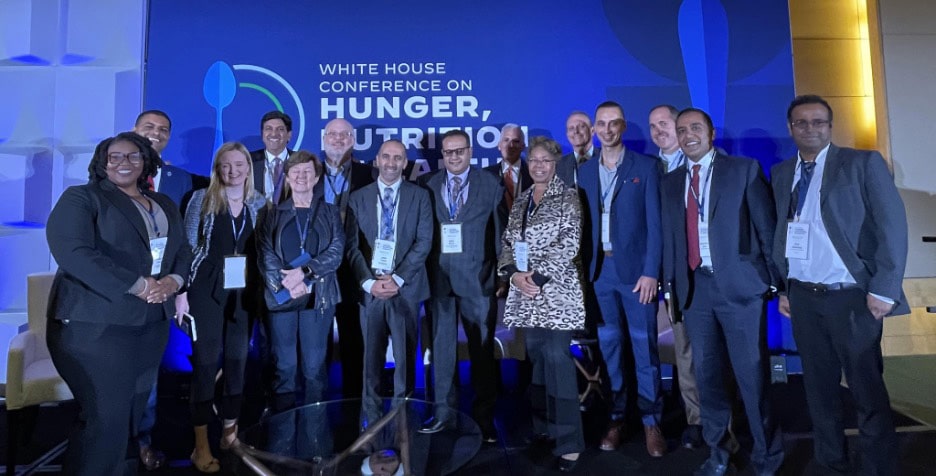Early Milestones on “Sync for Social Needs” Collaborative
By Catherine Flatley, Senior Policy Advisor
December 15, 2022
On December 6th, CMS announced the long-awaited update to a 2020 proposed rule, now called, “CMS 0057 Advancing Interoperability and Improving Prior Authorization Processes…” In addition to the new CMS rule, there have been major updates to SDoH rules. Accordingly, we wanted to share our initial take on the key provisions shortly, but as a preview for a social risk factors data RFI, here is an update on our “Sync for Social Needs” collaboration.
For context, on Sept 28th, 2022 the Biden administration convened the White House Conference on Hunger, Nutrition, and Health. I was honored to be able to attend this event, which served as the first White House conference on these critical topics in over 50 years.
Following a “discovery sprint” that involved detailed interviews with EHR vendors, SDOH Networks, and health systems, the HL7 team led by Brett Marquard and Dr. Josh Mandel heard enough initial feedback to organize a technical approach on the use of the “FHIR Observation” resource. To that end, on December 9, HL7 announced a new January 2023 US Core Ballot which includes updated guidance for how third-party applications can access social needs screening data. A sample query for the CMS “Accountable Health Communities” screening tool is accessible here.
Reflecting back on the White House Conference, while the opportunity to hear President Biden speak in person was humbling, perhaps even more significant was the call to action of the event. In advance of the conference, the Biden-Harris administration called on participants to make bold commitments to advancing progress on hunger, nutrition and health. The premise of bold commitments is no joke; I soon learned that commitments made at the first Hunger, Nutrition, and Health Conference in 1969 led to major milestones, including the creation of WIC benefits and food labels. Clearly, the expectations were high!
Despite all of the progress made since 1969, the recent conference illustrated the immense amount of work that is yet to be done. Statistics, including that over 38 million Americans suffer from food insecurity, illustrate the enormous inequalities that still exist. As a result, it was thrilling to help launch the Sync for Social Needs coalition which will help to streamline sharing of this critical screening information on social determinants of health including the lack of access to basic services, including healthy foods and stable housing.
As we launch Sync for Social Needs with a dozen stakeholders, we call on more pioneering organizations to help with three primary objectives:
- FHIR-based Standards: Solidify a single approach for the exchange of social needs screening data. During the environmental scan, conducted Fall 2022, EHR developers reported the optional US Core 5.0.0 design requirement of FHIR Questionnaire Response, in addition to FHIR Observation, would require them to support both for third-party applications. Supporting two approaches creates inconsistent access to screening data, and additional cost for the entire ecosystem. Based on this feedback, the editors updated the HL7 January 2023 US Core ballot to propose a single FHIR Observation approach to exchange social need screening data.
- Participation in Quality Measure Development: The leading quality organizations, NQF, the Joint Commission, and NCQA are in various stages of implementation for accreditation or consensus quality measures tied to health equity, starting with social needs screening and follow-up. We understand there is a great deal to learn in terms of what questions to ask, and in what context, to balance the opportunity to address social needs with respecting their sensitive nature. CMS acknowledged the need for more flexibility here as part of its SNP guidance on requiring screening by category without requiring specific instruments.
- Real World Testing: To advance data sharing standards and help achieve consensus on screening instruments, we need real world testing and feedback on what works, or what doesn’t work. In addition to testing standards and instruments already published, we seek pioneers willing to test alternative approaches, including read/write capabilities associated with sharing screening data across applications.
To date, many industry stakeholders have already begun participating in this effort but we are actively seeking more pioneering organizations willing to roll up their sleeves. Stay up to date at our Confluence page here.
We are thankful for our initial stakeholders: The National Quality Forum, the National Committee for Quality Assurance, the Joint Commission, HL7 International, Epic, Oracle-Cerner, Rush University System for Health, Tufts Medicine, Riverside Health System, SCAN Health Plan, Sanford Health, SSM Health, Higi, BayCare, Geisinger, Meditech, FindHelp, Wellsky, UniteUs, Graphite Health, Saffron Labs, XanthosHealth, COPE Health Solutions and HealthTech 4 Medicaid. To participate, please email: syncforsocial@HL7.org
Attending this White House event was an unforgettable experience made even more special by the opportunity to participate with our team of our coalition members who are committed to improving SDoH screening and reporting.
I look forward to sharing the success of the coalition’s work and hopefully not having my eyes closed the next time we take a group photo.

